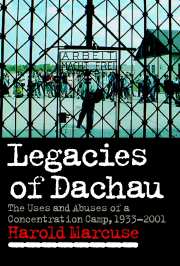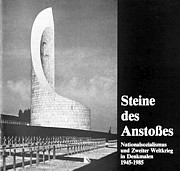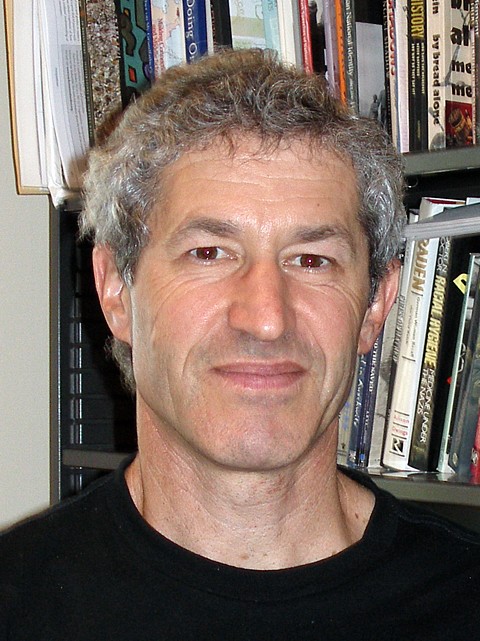2024 Teaching Schedule:
- Winter 2024: Hist 133B, German History, 1900-1945
Winter Office Hours: Wednesdays, 1-3pm, HSSB 4222 - Spring 2024: Hist 4C, Modern Europe, 1650-present
2024 update: I haven’t taught Hist 4C, “Europe, 1650-present” since 2000, when it was still called “Western Civilization, 1715-present.” See my 2000 Hist 4c syllabus and course materials here. A lot has changed since then, both in content and teaching methodology!
In addition to the World History survey (Hist 2c: 1700-present, F’16 syllabi and assignments), I teach upper division courses covering German history from 1800 to present (Hist 133A,B,C), including topical courses about the Nazi Holocaust and other genocides, and their legacies (Hist 133D and seminars 133Q and 133R). My research focuses on how, since 1945, various groups have looked back on events in German history, and what meanings they construct from that retrospection.
In UCSB’s graduate program I teach courses about museums (webpage) and what is commonly called collective memory (detailed syllabus/website with many pdf readings), as well as about digital history (201DH: Digital History webpage with 2015 syllabus), World History (200WD webpage) and German history (2002 syllabus).
My personal website has web pages about my research and the full texts of many of my publications. Sections below on this web page have direct links to my more important publications.
- Iconic Events of Twentieth Century German History: How We Know What We (Think We) Know.
Now more than ever in the age of the internet and disinformation it is not so much what we know–every internet-connected device can produce that–, but understanding how and why we know it that is important. This project turns the usual narratives of events in German history from the outbreak of World War I to the end of World War II on their head. It views a series of iconic events that have shaped our interpretations through an analysis of the sources we use to reconstruct them, then traces how those reconstructions have evolved over time. The selected events center around the origins of Hitler’s genocide, the question in German history more than any other that has engaged the broader public and historians alike. In each case study I examine the key sources, tracking their discovery (or invention), then how seminal interpretations have changed over time. - Das Erbe von Dachau (see my Dachau Page for more information)
A shorter but updated to the 2010s German-language version of my 2001 monograph Legacies of Dachau, which will include the redesign of the memorial site since 2003, as well as new research on the history of specific aspects of the camp and site after 1945. - Using the Internet to disseminate historical knowledge
An important component of my teaching is to have students conduct original research and publish it on the Web. My current project (2014-2020) is a collection of “source biographies” that detail how canonical sources about German history from 1757 to 1991 were created and then chosen to be part of canonical teaching materials. For background on the goals of the project, see this 2004 thesis paper.
- Legacies of Dachau: The Uses and Abuses of a Concentration Camp, 1933-2001

600 page book about the history and afterlife of the former concentration camp until its most recent redesign. (my Legacies of Dachau page) - “Holocaust Memorials: The Emergence of a Genre,” in: American Historical Review (Feb. 2010)
An AHR “forum” essay on representations of the Holocaust that traces the development of Holocaust memorials from 1943 to the 1960s. (25Mb pdf) - Stones of Contention: National Socialism and Second World War in Monuments and Memorials, 1945-1985
32-page, richly illustrated booklet accompanying an exhibition that toured Germany from 1985 to 1992. (complete booklet on-line) - “The Revival of Holocaust Awareness in West Germany, Israel, and the United States,” in: 1968: The World Transformed (Cambridge 1998), 421-
This essay examines how the Holocaust became a talked-about event in three countries in the 1960s. (full text) - “Experiencing the Holocaust in Los Angeles: The Museum of Tolerance,”, in:

on-line journal Other Voices, 2:1(2000) - “Generational Cohorts and the Shaping of Popular Attitudes Towards the Holocaust,” in:Remembering for the Future (2001), 652-663.
This essay summarizes the generation/cohort theory I develop at the beginning of chapter 12 of Legacies of Dachau. (text) - “Reshaping Dachau for Visitors, 1933-2000,” in:Horror and Human Tragedy Revisited: The Management of Sites of Atrocity for Tourism
(New York, 2005), 118-148. (presentation text) - “History, War and Memory,” in: Gordon Martel (ed.), A Companion to Europe, 1900-1945 (Oxford: Blackwell, 2006), pp. 487-503. (searchable at amazon.com)
This essay offers an overview of its topic for the period from 1945 to the present in 11 countries. (pdf of “History, War and Memory”) - For a complete list of my publications, with links to most texts, see
My Publications Page. - For a complete list of my reviews, with full texts, see My Book Reviews Page
Most are illustrated and have links and additional information not contained in the published versions.
- Hist 133A “19th Century Germany”: Fall 2018 133A syllabus
- Hist 133B “20th Century Germany I: 1900-1945”: W’19 Syllabus,
- Hist 133C, “20th Century Germany II, 1945-present”: 133C website with 2019 syllabus
- Hist 133D, “Genocides in European History” (133D website)
- Hist 133Q: “Reading Seminar in Holocaust and Genocide History”: 133DR website
- Hist 133R: “Research Seminar in German History”: 133R website with 2019 syllabus
My book Legacies of Dachau: The Uses and Abuses of a Concentration Camp, 1945-2001 won the 2003 Hans Rosenfeld book prize won the for the best monograph on central European history published in 2000 or 2001.

